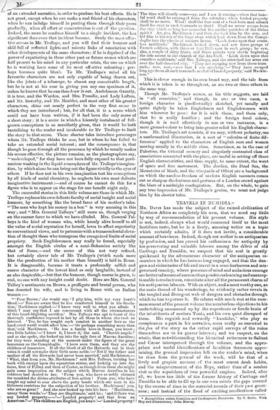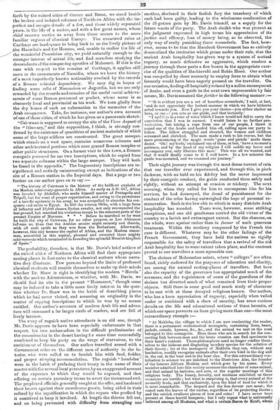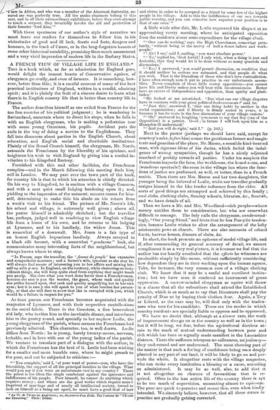TRAVELS IN N M1DIA. - 44 Mn. DAVIS has made the
subject of the ruined civilization of Northern Africa so completely his own, that we need say little by way of recommendation of his present volume. His style is not, indeed, always what would commend itself to the most
fastidious taste, but he is a lively, amusing writer on a topic which certainly admits, if it does not invite, a considerable amount of heaviness. Indeed, though our author is an antiquarian by profession, and has proved his enthusiasm for antiquity by his persevering and valuable labours among the debris of old Carthage and Numidia, we suspect that his zeal is greatly
quickened by the adventurous character of the antiquarian re- searches in which he has been so long engaged, and that the dan-
gers and vicissitudes of life and travel in a semi-barbarous and mis- governed country, where presence of mind and audacious courage are better tali s m ans of success Ulan ponderous learning and unexcep- tionable introductions, constitute alter all the paramount charm of his antiquarian labours. With an object, and a most worthy one, as the main thread of his wanderings, he evidently rather revels in the tangled and divergent web of dangers and obstacles through which lie has to pursue it. He relates with much zest at the com- mencement of the present volume the numberless objections to his undertaking summoned up by the experience or fertile brain of the inhabitants of modern Tunis, and his own quiet disregard of them. His roguish and cowardly " hainbdas," who play so conspicuous a part in his narrative, seem really as essential to
the fiat of the story as the rather rapid surveys of the ruins themselves are to its graver interest ; and we suspect, on the
whole, that notwithstanding the histoiical refereuces to Sallust and Caesar interspersed through the volume, and the appro- priate and useful identifications of localities thereunto apper- taining, the general impression left on the reader's mind, when he rises from the perusal of the work, will be that of a lively and graphic account cf the most recent Arab habits, and the misgovernment of the Boys, rather than of a sombre visit to the sepulchres of two powerful empires. Indeed, after all, we know too little of the former history of Carthage and Numidia to be able to fill up in our own minds the gaps created by the course of time in the material records of their past great- ness; and instead of the flood of exciting recollections called
* Ruined Cities within Numitlien and Carthaginian Terriaria. By N. Davis. With Map and Illustrations.: John Unruly.
forth by the ruined cities of Greece and Rome, we stand beside the broken and isolated columns of Northern Africa with the im- perfect and meagre details of a few, and those widely separated years, in the life of a nation, and with a few great names, whoie chief renown carries us away from these scenes to the more familiar regions of classical Europe. The excavated ruins at Carthage are inadequate to bring back to us the lively picture of Hannibals and the Halmos, and, unable to realize the life of
,--"--)the wonderful Phoenician city, we yield naturally enough to the stronger interest of actual life, and find ourselves studying the descendants of the conquering apostles of Mahomet. If this is the case with respect to the remains of Carthage, it applies still
more to the monuments of Numidia, where we have the history of a most imperfectly known nationality overlaid by the records of a Roman colonial dependency. We may dig in hopes of finding some relic of Massanissa or Jugurtha, but we are only
rewarded by the records and remains of the useful social achieve- ments of some Roman proconsul or prefect, whose name is as
obscurely local and provincial as his work. We turn gladly from the dry bones of such an exhumation to the memories of the Arab conquerors. Take, for instance, our author's own account of one of these cities, of which he has given us a panoramic sketch: "Cairwaan is supposed to occupy the site of the Viols Augusti of the " Itinerary," and this supposition, I think, is strongly con- firmed by the existence of quantities of ancient materials of which some of the large edifices are constructed. The great mosque, which stands on a vast space, contains numerous columns and other architectural portions which once graced Roman temples or other public structures. On a former visit to this town, a Roman renegado procured for me two inscriptions, which he copied from two separate columns within the large mosque. They will both be found in the appendix." The fragmentary inscriptions are in- significant and entirely uninteresting except as indications of the site of a Roman station in the Imperial days. But a page or two further on our author goes on to say :—
" The history of Cairwaan is the history of the brilliant exploits of the Moslem missionary-generals in Africa. As early as A.D. 647, Africa was invaded by Abdellah, who made himself master of Pentapolis and Tripoli, but for want of proper organization, and owing to the prevalence of a terrific epidemic in his army, he was compelled to abandon his con- quests end retire to Egypt. Iu 660 the veteran Okba, with a large force of infantry and 10,000 chosen Syrian cavalry, not only reconquered the lost ground, but marched his victorious troops to the remotest parts of the present Empire of Morocco. • * * Before he marched so far west he built the city of Cairwaan, for no other purpose, as Leo Africanus informs us, than that the Arabian armies might securely rest therein, with all such spoils as they won from the Barbarians. Afterwards, however, this city became the capital of Africa, and the Moslem states- men, assembled in this capital, planned and executed those mighty achievements which terminated in founding the splendid Moorish kingdom of Spain."
The probability, therefore, is that Mr. Davis's brief notices of the ruined Macs of Northern Africa will find their appropriate resting-places in foot-notes to the classical authors whose narra- tive they illustrate. Few persons beyond the limits of professed classical students will trouble themselves to make up their minds whether Dr. Shaw is right in identifying the modern " Hercla" with the ancient Adrumentum, or whether, with Mr. Davis, we should find its site in the present " Hanmanet," though some may be induced to take a little more lively interest in the ques- tion whether Dr. Shaw was in the habit of describing places which he had never visited, and assuming an originality in the matter of copying inscriptions to which he was by no means entitled. Our author's accounts of modern Arab life and adven- ture will command a far larger circle of readers, and are full of lively interest.
The story of roguish native attendants is an old one, though Mr. Davis appears to have been especially unfortunate in that respect, his two ambassadors in the difficult preliminaries of the commissariat in the desert having for some time successfully combined to keep his party on the verge of starvation, to the enrichment of themselves. Our author travelled armed with a Government order on the different men of authority in the in- terior, who were called on to furnish him with food, fodder, and' proper sleeping accommodation. The roguish " hambdas" were in the habit of prefacing their treaty in the name of their master with the several local potentates, by an exaggerated account of the expenses to which they would be exposed, and then offering on certain pecuniary terms to avert the threatened evil. The perplexed officials generally caught at the offer, and hardened their hearts against their unwelcome guests, being aided in their refusal by the mystification in which the rogues who profited by it contrived to keep it involved. At length the thieves fell out, and on being prevented with difficulty from strangling one another, disclosed in their foolish fury the treachery of which each had been guilty, leading to the wholesome confiscation of the ill-gotten gain by Mr. Davis himself, as a supply for the future wants of the party. The Arab sheikh who was present at the judgment expressed in high terms his appreciation of its justice and efficacy, loss of money being, as he observed, the only way of really punishing these scoundrels. The fact, how- ever, seems to be that the Mainlook Government has so entirely demoralized the territories which groan under their rule, that the ancient Arab hospitality has given way to a system of mutual roguery, as much defensive as aggressive, which renders a journey through these parts a fine lesson in the appropriate exer- cise of the qualities of Machiavelli and Robin Hood. Our author was compelled by sheer necessity to employ force to obtain what formerly would have been eagerly pressed on the traveller. On one occasion, finding all hospitalityrefused by a sullen encampment
of Arabs, and even a guide to the next town unprocurable by fair means, Mr. Davis assumed the fortiter in the following manner: manner:— "'It is evident you are a set of heartless scoundrels,' I said, at last, and do not appreciate the lenient manner in which we have hitherto acted towards you. Now I give you your choice—you either shelter us. here, or one cf you acts as our guide, and that instantly.'
"I said this in a tone of voice which I knew would not fail to carry the conviction that I was in earnest. I would listen to no further pre- varication, but taking a rope from one of our people, I threw it round one of the Arabs and hauled him off, calling upon our party to follow. The fellow struggled and shouted, the women and children screamed and shrieked. The men made a rush to his rescue, but the mere pronouncing of the magic words guns and pistols' made them desist. 'Oh ! my lords,' exclaimed one of them, at last, have a moment's patience, and by the head of my religion I will saddle my horse and accompany you, only liberate this man.' This was all we wanted, and that it would finally come to it I well knew. In a few minutes the guide was mounted, and we resumed our journey."
Their night journey was through the most dense torrent of rain that our traveller ever experienced, and through this, in pitch darkness, with no hold on his fidelity but the terror impressed by their energetic conduct, the guide conducted them safely and rightly, without an attempt at evasion or trickery. The next morning, when they called for him to recompense him for his services, he had decamped, the dread of punishment for the conduct of the tribe having outweighed the hope of personal re- muneration. Such is the low ebb to which in many districts Arab hospitality has receded. There were, however, some striking exceptions, and one old gentleman carried the old virtue of the country to a lavish and extravagant extent. But the chances, on the whole, were against rather than in favour of such generous treatment. Within the territory conquered by the French the case is different. Whatever may be the other failings of the French Government, they have held the natives so rigidly responsible for the safety of travellers that a revival of the:old Arab hospitality has to some extent taken place, and the contrast proVed to our travellers a most agreeable one.
The shrines of Mahometan saints, where " colleges" are often found, richly endowed for the purposes of education and charity, are among the natural resting-places of travellers. But here also the rapacity of the governors has appropriated much of thee revenues, and the roguishness of some of the guardians of the shrines has diverted much of what remained from their proper objects. Still there is some good and much study of character to be met with at these decayed religious houses. Our author, who has a keen appreciation of roguery, especially when veiled under or combined with a show of sanctity, has some curious details on the life and educational notions of these hermits, of which our space prevents us from giving more than one—the most extraordinary example :—
" At Makloba, the village to which I am now conducting the reader, there is a permanent ecclesiastical menagerie, containing lions, bears, jackals, camels, hyaenas, &c., &c., and the animal we met on the road belonged to this menagerie. Here those who are in search for the con- necting link between man and the brute creation can find specimens to their heart's content. Those philosophers need no longer confine them- selves to the hideous and disgusting monkey species for the solution of their theory ; for at the menagerie of Makloba they can, without any hesitation, readily recognize animals after their own kind in the dog and in the cat, in the bear and in the boar also. For this extraordinary con- tribution to science we are indebted to the illustrious Aisa, the founder of the famous African Moslem sect which goes by his name. Every member admitted into this society assumes the character of some animal, and that animal he imitates, and acts, at the regular meetings of this religious body. The frenzy, ferocity, and madness exhibited on these occasions are terrific ; but what is surprising is, that every animal at the assembly feeds, and that exclusively, upon the kind of food for which it is most remarkable. The leopard and the lion devour raw meat ; tho camel eats the loaves of the cactus, regardless of its projecting thorns ; and the ostrich swallows pieces of iron and coins ! I have never been present at these horrid banquets ; but I only repeat what is universally believed among all Moslems, and what a certain Belson de Kraft, whom
'saw in Africa, and who was a member of the Aisaweah fraternity, as- sured me was perfectly true. All the snake-charmers belong to this sect, and in all their extraordinary exhibitions, before they even attempt to touch a serpent, they invariably invoke the aid and protection of their founder lord Aisa.' "
With these specimens of our author's style of narrative we must leave our readers for themselves to follow him in his vicissitudes of good and ill luck, feasts and fasts, dangers and honours, in the track of Caesar, or in the long-forgotten haunts of some other historical notability, promising them much amusement and a very vivid impression of modern life in the Barbary States.




























































 Previous page
Previous page